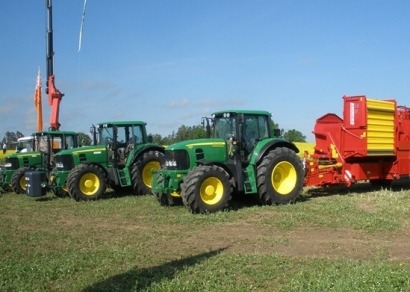
According to the 2ndVegOil website, “carbon dioxide neutral engines will be a key issue for future farming since this will open the energy market for farmers and contribute to sustainability at the same time”. Consequently, the joint research and technical development and demonstration project running for three years from August 2008 to July 2011 pushed the former developments of neat vegetable oil powered engines to be ready for coming exhaust regulations (EU stage 4 for off-road vehicles respectively EURO 6 for road vehicles).
10 organisations including industry, SME, a university, an energy agency, two agricultural organisations and a standardisation body, co-financed under the European Commission’s 7th Framework Programme, have proved that modern exhaust gas treatment systems work well when used with pure vegetable oil fuels. For the best combination of engine performance while meeting current and future emission regulations, both the engines and the fuels made from pure vegetable oils have been idealized.
In the final closing statements presented during the "Representation of the Free State of Bavaria to the European Union" in Brussels in December, representatives from government and professional circles all praised the innovative technology and the ecological approach of the project.
2ndVegOil says the agricultural sector is “ideally suited as a market” because the decentralised structure of cultivation and oil extraction means there is a very short and thus highly efficient, closed circuit from fuel production to consumption, because the fuel producer becomes the customer.
Stefanie Dieringer and Prof. Dr. Peter Pickel (Project Manager responsible for the coordinator John Deere ETIC Unit) said during the presentation that "We do not have the solution for the planet, but we have the solution for those who feed the planet".
“Due to the sustainable framing methods used to produce oilseed, conservation of resources, reduced costs and increased biodiversity may be expected,” 2ndVegOil finds. The project also delivered evidence that vegetable oil fuels will meet all future requirements for biofuels from the EU Directives on renewable energy and fuel quality (28/2009/EC and 30/2009/EC).
Political climate must improve
Despite the project’s optimistic findings, an obstacle to product launch was once more cited: the current political conditions. Jo Leinen, Chairman of the Environment Committee of the European Parliament reaffirmed the importance and the need of much stronger political support, while Dr. Ruppert Schäfer from the Bavarian Ministry of Agriculture said: "We urgently need the harmonisation of agricultural diesel taxation within the EU". He called for more substantial start-up assistance from the EU.
The representative of EC Vice-President Siim Kallas, Laure Chapuis, was also presented a document concerning the pre-standards for European vegetable oil fuels. Other participants, such as Hans-Josef Fell, MdB; Franz-Xaver Söldner, EC DG MOVE; and Hornek Erwin, a member of the National Council of Austria showed enthusiasm about the project's success.
In addition to John Deere, nine other European project partners, three from Bavaria (regineering - Duft & Innerhofer GbR, Denkendorf; United Workshops for Plant Oil Technology, Allersberg and Institute for Combustion Engines at TU Munich) worked together with sub-contractors on the technological, economic and environmental issues. In four countries, 16 tractors contributed around 24,000 work hours in the field in addition to the countless hours of work on motor testing, by among others: the Technology and Research Center Straubing.
Deere & Company is a leading manufacturer of machines for agriculture, forestry and construction as well machinery for lawn and grounds maintenance, based in the United States. The "2ndVegOil" project was coordinated by John Deere in Mannheim and the John Deere European Technology Innovation Center in Kaiserslautern, both in Germany.
The report "Climate design of Pure Vegetable Oil Fuels" summarising the findings of the project will be published in February. An executive summary is available here.
For additional information:

